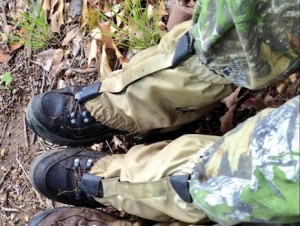Even though the heat is winding down, nasty biting bugs still abound. Don’t get bit!
Unfortunately, more and more diseases are being spread by insects these days. Short of staying indoors, how do you protect yourself from getting bitten by a possibly disease-carrying tick or virus-spreading mosquito? Here are some tips on how to reduce the number of bites you get while still enjoying your time outdoors.
Preventing bites
Treat your clothing with a repellent, such as DEET or Permethrin. I prefer using the Sawyer Products Premium Permethrin spray on all my hunting gear. Be sure to treat all your hunting clothing and gear before your time afield. Spray them outdoors, in a well-ventilated area, and allow them to dry completely. Do not spray Permethrin directly on your skin. Permethrin is odorless when it dries, so it is perfect for scent-conscientious hunters. Permethrin will last for up to 6 washings, or 6 weeks.
Another product I rely on to protect me from mosquitoes and other flying biters is a ThermaCell Mosquito Repellent Appliance. ThermaCells protect a 15-foot area against mosquitoes, black flies and biting insects. They carry a very slight odor, but I still use them when deer hunting. The pros far outweigh this one little con in my book.
 Outdoor Researches BugOut gaiters are another piece of gear I use as a preventative measure. The gaiters are treated with Insect Shield, which repels mosquitoes, ticks and other biting insects.
Outdoor Researches BugOut gaiters are another piece of gear I use as a preventative measure. The gaiters are treated with Insect Shield, which repels mosquitoes, ticks and other biting insects.
Even without commercial repellent, there are still some steps you can take to minimize biting. Tucking your pants legs inside your boots and your shirt into your pants makes it more difficult for those pesky critters to make their way in to your body.
While walking in the woods, stay in the center of the trails whenever possible. The more contact you have with the brush, the more opportunities there are for unwanted hitchhikers.
After your time outdoors be sure to shower as soon as possible to wash yourself off and find any ticks that may be crawling on you. Conduct a full-body check. Check out your gear and vehicle seats, too. Ticks can ride home with you and attach themselves to you or your pets later.
Even if your hunting clothing doesn’t need to be washed, throwing it into a dryer and running it on high heat for an hour will kill any remaining ticks.
Tick-borne diseases of the United States
According to the Centers for Disease Control and Prevention there are at least 14 different tick-borne diseases. Some of the ones more commonly known are Lyme disease, Erlichiosis, Rocky Mountain spotted fever and ‘Alpha-Gal’ (Galactose-alpha-1,3-galactose, a delayed allergy to mammal meat often caused by tick bites.) Ticks carry the pathogens that can cause these diseases in humans.
Brenda Valentine, known as “the First Lady of Hunting,” has unfortunately been affected by tick-borne diseases. “After contracting two serious tick-borne health issues I am particularly diligent in my battle with ticks and other biting insects when afield,” she says. “I buy Permethrin-based insect repellent by the case lot, using it liberally on all my clothing and hunting equipment. I tuck pantlegs inside tall boots, wear a tucked in undershirt beneath my regular hunting shirt. Dressing in light layers makes it harder for these tiny vampires to find unprotected skin. My turkey vest, backpack, boots, cap and other gear is sealed in a large garbage bag after a liberal spraying with Permethrin. This is the best defense I have found against all varieties of disease-carrying ticks.”
If you do find a tick attached to you, carefully remove it as soon as possible, making sure to get all of it removed.
Watch for symptoms within a few days up to a few weeks. These can include fever, chills, aches, pains and rashes. Tick-borne diseases can range in seriousness from an infection, which can be treated by your family physician, to conditions requiring hospitalization and ongoing lifestyle changes. Early detection and treatment decreases the risk of serious complications. If you’ve been bitten and experience any of these symptoms, see your physician immediately.
Viruses spread by mosquitoes
The CDC website lists three viruses caused by mosquito bites. West Nile virus is the most common one spread through mosquito bites in the United States. The other two mosquito-borne viruses are chikungunya and dengue, common to other parts of the world. There are no medications to treat these infections, nor vaccinations to prevent them. Fortunately, most people who are infected will have no symptoms, but those who do can experience high fever, joint pain and/or swelling, headaches, muscle pain and rashes. If you experience any of these symptoms seek help from your physician as soon as possible.
As the old saying goes, “An ounce of prevention is worth a pound of cure.” That fits very well when we’re talking about being bitten by a potentially disease-carrying insect.
Marti Davis is a staff member for Browning Trail Cameras, WoolX and Mossy Oak. She is an authority on most types of hunting in North America, and very active in mentoring the next generation of young hunters. View all posts by Marti Davis